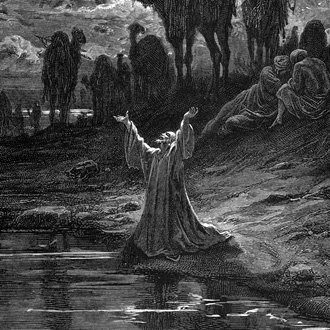Wednesday, June 25, 2008
The Audacity of Hope (Habakkuk 1-3)

Wow, it’s been a while since my last post here. I suppose I’m doing what many readers of the Old Testament have done before me: I’ve gotten bogged down in the prophets. And these are just the “minor” prophets at that! Anyway, sorry about the title. I know it's a shameless ripoff, but it just so happens to also be a perfect title.
Hope seems to be one of the strongest themes in the Old Testament. Not optimism, mind you. Things don’t ever seem to go all that well for the people of Israel, and even the most glorious moment of their story, the exodus from Egypt, is filled with failure and judgment so severe it almost ended the story before it began. Yet every page is bursting at the seams with an unshakable hope in the goodness of God.
It is common indeed for people today to ask “where was God” when a tragedy strikes. It is even more common for eggheads like me to do so in a detached and cynical fashion about tragedy in the abstract (the problem of evil). But it makes every difference in the world whether the question is asked out of despair or hope. Indeed, those who hope can scream for God with a volume scarcely reachable by more tepid and bitter voices:
O Lord, how long shall I cry for help,Thus says the prophet Habakkuk, in the face of the idolatry and injustice of Israel. God responds by bringing the Chaldeans (or Babylonians) to be the great equalizers of a corrupt and haughty civilization. But even this “salvation” is ambiguous. The Chaldeans exploit and abuse every kingdom known to man. It is true that the poor now see the rich getting their comeuppance, but the people of Israel as a whole must struggle under their yoke. Rich and poor suffer alike.
and you will not hear?
Or cry to you “Violence!”
and you will not save?
Why do you make me see iniquity,
and why do you idly look at wrong?
So Habakkuk asks again:
O Lord, you have ordained them as a judgment,The Chaldeans may be God’s way of judging the people of Israel, but they themselves are calling down judgment on their own heads:
and you, O Rock, have established them for reproof.
Is he then to keep on emptying his net
and mercilessly killing nations forever?
Woe to him who builds a town with bloodThe wrath of man doesn’t achieve the justice of God, and so even man as God’s instrument stands condemned. Israel has failed his task of upholding the law as a light to the nations, and instead has fallen into idolatry and injustice. Babylon has failed in her task of punishing Israel justly, and instead arrogantly assumes the entire world will be her prey. This is what the Lord saw when, before the flood, the Earth was filled with violence and the intentions of man’s heart were only evil continually. No wonder the Bible speaks of God being tempted to destroy man for good.
and founds a city on iniquity!
Behold, is it not from the Lord of hosts
that peoples labor merely for fire,
and nations weary themselves for nothing?
For the earth will be filled
with the knowledge of the glory of the Lord
as the waters cover the sea.
This is all hardly grounds for optimism. So the prophet leaves optimism behind, and clings to hope instead:
Though the fig tree should not blossom,Hope looks into the blackness of utter despair and total ruin and says, with defiance, “yet I will rejoice.” Such hope isn’t sentimentality or wishful thinking. It refuses to submit to the dark facts of reality, and so changes that reality by bringing the rule of God to bear.
nor fruit be on the vines,
the produce of the olive fail
and the fields yield no food,
the flock be cut off from the fold
and there be no herd in the stalls,
yet I will rejoice in the Lord;
I will take joy in the God of my salvation.
God, the Lord, is my strength;
he makes my feet like the deer's;
he makes me tread on my high places.
Thus Noah found favor in the eyes of the Lord. Thus Abraham believed God, and it was counted to him as righteousness. Thus Moses turned the face of God back towards his rebellious people. Thus David established an everlasting kingdom. And thus the tomb of the son of David was found empty, for hope does not disappoint.
Click Here to Continue Reading this Post...
Home
Who is Oyarsa?
Contact Me
Blog the Bible
Recent Comments
Archives
- June 2006
- July 2006
- August 2006
- September 2006
- October 2006
- November 2006
- December 2006
- January 2007
- February 2007
- March 2007
- April 2007
- May 2007
- June 2007
- July 2007
- August 2007
- September 2007
- October 2007
- November 2007
- December 2007
- January 2008
- February 2008
- March 2008
- April 2008
- May 2008
- June 2008
- July 2008
- September 2008
- October 2008
- November 2008
- July 2009
- August 2009
- January 2010
- August 2010
Recommended Books